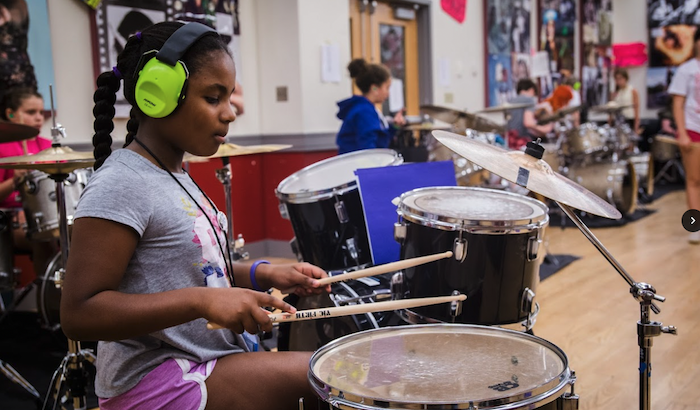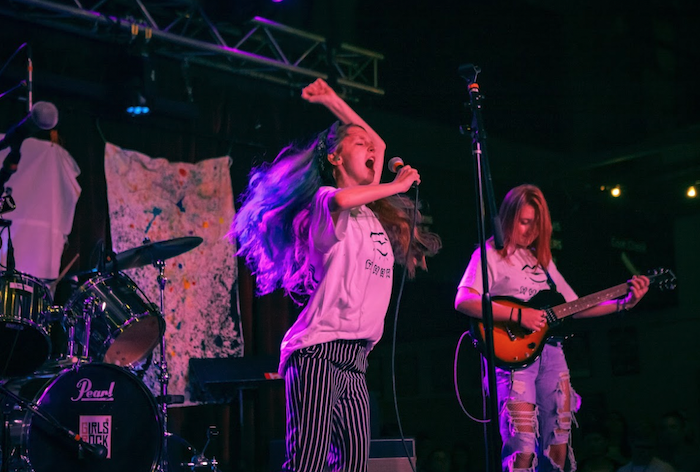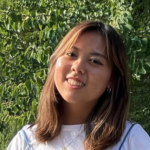
“It’s taking this thing that may seem so inaccessible, but can be so powerful, and showcasing that youth can really take advantage.”
Youth musicians will once again have their voices and instruments heard on the Boston music scene. Girls Rock Campaign Boston is set to hold its summer sessions in-person for the first time since 2019.
The nonprofit dedicated to empowering youth through music will return to its normal programming, although with various safety measures and a number of changes. The summer sessions are week-long programs at the Record Co. in which participants, both with and without previous music experience, will immerse themselves into writing and performing within bands. At the end of the week, youth perform in a showcase at Brighton Music Hall.
“Everyone is like three years older, which is so exciting,” said Nora Allen-Wiles, co-founder and executive director. “These little youth are now teens [and are] coming back.”
Registration for the two summer sessions opened April 1, and a limited amount of spaces are still available. For the first session—July 18 through 23—youth ages 8-10 and 14-17 can apply. For the second session—August 8-13—there are spaces for youth 14-17 as well as volunteer spaces for bass and drum instrument instructors.
GRCB has adapted virtually since the start of the pandemic. In 2020, staff created a research program for teens called Youth Activism Project, and in 2021 they hosted online summer and vacation sessions in which youth created music through a digital audio workstation. Despite the successes of these programs, the organization looks forward to the live energy of in-person sessions.
“Just the amount of Zoom fatigue for our youth and volunteers was showing in 2021 … so we’re really excited to bring it back in person,” said Charlotte Huffman, director of community-based programs.
Although the summer sessions typically involve close-knit group work, staff will ensure social distancing through more individualized instruction and outdoor activities. Youth and volunteers will also follow vaccination requirements and wear masks. Additionally, the venue for the sessions, the Record Co., has air filtration systems designed for pandemic safety.
GRCB was established in 2010 by Allen-Wiles and Hilken Mancini and is tied into an international network of youth music programs. While the summer sessions teach musicianship, they also channel the counterculture spirit embedded in rock to explore social justice issues.
The organization seeks to uplift youth of marginalized gender identities by encouraging expression through rock music, a genre that has been historically exclusionary.
“It’s taking this thing that may seem so inaccessible, but can be so powerful, and showcasing that youth can really take advantage,” Allen-Wiles said.

Along with instrument practice, youth participate in workshops about gender equality and building inner confidence. GRCB emphasizes that it is open to youth of all marginalized gender identities. At a time when gender identity and expression is becoming increasingly restricted, GRCB is eager to provide people with a sense of community.
“We’re all about giving folks the tools to resist oppressive systems, to stand up for themselves and for others,” said Nina Lee, director of session-based programs.
To achieve its own mission, GRCB has had to address its own social justice issues within the organization. During the racial reckoning of 2020, the nonprofit sent out feedback surveys through which community members raised concerns about the lack of diversity among GRCB staff and participants. The nonprofit then had to reflect on how its operations created inequality.
“People were coming to our programming, and we weren’t examining who was coming into our programming,” Allen-Wiles.
Starting in August 2020, GRCB began community discussion meetings known as Snacks n Chats. In July 2021, the organization announced its partnership with diversity, equity, and inclusion consulting group VISIONS and later, the creation of a DEI working group.
This summer, applications are no longer accepted on a first-come, first-served basis. Instead, GRCB will review applications “to foster fairness and diversity.”
Another recent development is the decision to change the organization’s name to be fully representative of its inclusive nature. In light of the anti-trans legislation pushed around the country, GRCB voted in March to update its name. The organization is still in the process of making this change and is gathering the input of youth voices.
“Our community has always included more than just girls, right? … folks all along the gender spectrum have been a part of our community since the beginning,” Huffman said.
The organization will continue to shift behind the scenes as Allen-Wiles prepares to step away in the fall. Mancini left at the beginning of the pandemic, and with the exit of both co-founders, GRCB has the potential for “new life and new breath.”
“It’s really exciting to know that this organization is going to continue on to do amazing things with new people involved,” Allen-Wiles said.
Whatever the future holds for GRCB, the idea of using music as a means for community building remains central. Lee, who joined the staff this year and is a former youth participant, says GRCB equips youth to choose their own paths—in music and beyond. As a queer adolescent at GRCB, Lee saw a glimpse into the kind of life she could have.
“[It] was mindblowing that you could have a queer family and be happy and be sustained,” Lee said. “It rewrote a lot of the definitions and things that I thought were fact.”
The return of the in-person summer sessions offers a way to sustain this mode of community.
“Music is just the vehicle,” Huffman said. “It’s really about the social justice.”
Tickets for the session 1 showcase will go on sale June 23; tickets for the session 2 showcase will be available July 13.
grcboston.org
Abigail Lee is a freshman journalism major at Emerson College from Hershey, Pennsylvania

